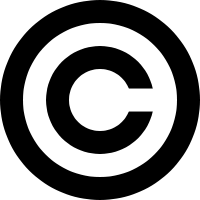Copyright in a Nutshell
This is a short, simple guide to copyright issues. Let's get started...

Original work is automatically copyright
If you create something original, you don't need to do anything in order to claim copyright. You don't need to include the © symbol, you don't need to post a copy to yourself or deposit a copy in a library. The only requirement is that the work is entirely original.
Of course it pays to have some good evidence that you produced the work, in case you enter into a dispute later on. Having your work published is obviously a good option if possible, but even posting on a blog is better than nothing.
Modifying someone else's work
You can't modify someone else's work and call it your own. This becomes a gray area when a work is used as research material, in fact a common quote says: "Copying from one source is plagiarism, copying from multiple sources is research". This isn't true of course; copying is copyright infringement no matter how many sources you rip off. However it is possible to use multiple sources, with attribution, in legally acceptable ways (see how I do it).
Fair Use
The term "fair use" applies only in the United States. It means that copyright work may be used in certain circumstances such as parody. This definition does not hold any legal weight outside the US, although other countries do have provisions for using small portions of copyright material for criticism and education. This is widely known as "fair dealing".
Fair use and fair dealing are quite specific, and you must make sure you meet the requirements. If you think you can grab parts of your favorite film or music to mashup into a YouTube video and call it fair use, you're probably wrong.
Public Domain
Public domain material is actually relatively rare. A work will only be public domain if one of the two following conditions are met:
- The copyright has expired (typically 70 years after the author's death, although this varies), or
- The work has been explicitly released into the public domain by the author.
Do not assume a work is public domain just because it's publicly available. Being on the Internet does not make a work public domain, in fact most material on the Internet is copyright.
Giving credit
Giving credit (attribution) does not mean it's okay to copy. Although attribution is desirable, it does not affect the copyright status and does not get you off the hook.
Copying for non-profit
It's a myth that it's okay to ignore copyright if you're not making any money from it. That's like saying it's okay to steal a car as long as you're not going to use it as a taxi.
Creative Commons
Many works have a creative commons license, which means you may use the work according to the specific conditions of the license (these vary). It is still copyright.
Permission
In many instances you can obtain permission to use copyright material. Be sure to understand and adhere to the conditions of that permission.
Be aware that some large companies (e.g. Google, radio stations) have wide-reaching agreements that allow them to reproduce copyright work. This does not mean that you have the same permission. In other words, just because you see a public search engine display pages from a book, this does not mean you have the right to use that material.
Justifications for copyright infringement
People often justify copyright infringements with arguments such as:
- It won't hurt the author or cost them money, so there's no problem.
- I'm doing the author a favour by promoting their work.
- It's in the public interest that I use some particular work.
- The author is so wealthy it doesn't matter if I use their work in my little blog.
- Lots of other people are doing it so it must be okay.
These are all psychological justifications that simply aren't valid.
Options
If you need to use some material and you're having trouble finding a legal source, your two best options are:
- Contact the copyright holder and ask for permission.
- Find other sources, such as stock libraries or Wikimedia Commons. These sources do have conditions but as long as you read and obey the rules, you can find lots of usable material.